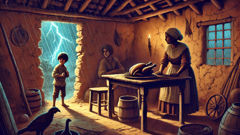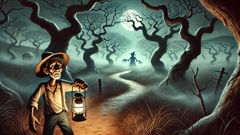Introduction
When dusk falls over the Cerrado—the vast, rugged savanna stretching across the heart of Brazil—shadows lengthen and the wind begins to carry whispers older than memory. Here, the land breathes with a wild spirit: twisted trees claw at the sky, tangled roots snake through cracked red earth, and a hush falls over even the boldest creatures. Yet, in these haunting twilight hours, it is not jaguars or ghostly owls that stir the deepest fears among villagers and travelers. It is the legend of Romaozinho, a name uttered with caution, a warning to the curious and the careless alike.
Romaozinho’s story is not one that parents tell to coax laughter or lull children to sleep. It is a tale woven from sorrow and cruelty, born in a time when villages clung to the edges of forest and field, and the boundaries between the living and the supernatural felt perilously thin. Among the people who tamed the Cerrado’s wildness—clearing patches for cassava and beans, building mud-brick houses, and gathering at dusk to share stories—Romaozinho was known as a boy with a black heart. His cruelty was not the mischief of an ordinary child but something deeper, sharper, capable of real harm.
In every village, older women would shake their heads and mutter about the day Romaozinho was born: the clouds hung low, dogs howled, and his first cry echoed like a threat. By the time he could walk, chickens scattered at his approach, and his mother’s voice carried a note of dread when she called him. The legend tells of how he tormented animals, set traps for unsuspecting villagers, and laughed when others cried. But his greatest crime—and the act that sealed his fate—came in a moment of unthinkable cruelty.
The story, as it’s been told for generations, begins with Romaozinho’s hunger and impatience and ends in a tragedy that ripples through the ages. His mother, weary from a life of hardship, prepared a roasted chicken to bring to her husband working in the fields. Romaozinho, unwilling to wait, stole the best morsels and when confronted by his mother’s gentle admonition, responded with an act so horrifying it would curse him forever.
In the hush of twilight, when the cicadas begin their mournful song, elders warn children not to wander the woods or linger on the old roads. For Romaozinho’s spirit is said to still roam, luring the unwary deeper into the wild, his laughter echoing through the trees. His story is a reminder that cruelty leaves scars not only on those it wounds but on the soul of the perpetrator—scars that, in the haunted wilds of the Cerrado, may never heal.
Roots of Cruelty: Romaozinho’s Mortal Life
Long before Romaozinho became a name whispered in dread, he was flesh and blood—a boy born into a world that offered little comfort and less forgiveness. His village, nestled at the edge of the Cerrado’s endless green and gold, clung to survival with the grit of its people. Here, every meal was hard-won, every shelter battered by sun and rain, and every family’s joy measured against the constant threat of hunger and disease.

Romaozinho’s father was a laborer, his hands scarred and strong, his silence heavy at the dinner table. His mother, Rosa, was gentle, her laughter a rare and precious thing in the harshness of their days. Yet from the start, their only son seemed out of place—a storm trapped in a boy’s body. He was quick, cunning, and tireless, but where other children sought games and companionship, Romaozinho found pleasure in domination. He would upend ant nests and delight in the panic that followed; he’d pull the tails of stray cats and hide sharp stones in the paths that led to neighbors’ doors.
Rosa did what she could to soften her son’s edges. She told him stories of saints and kindness, of forgiveness and hope. She showed him how to tend a garden, how to nurse wounded birds. But where the seeds of goodness took root in most, they withered in Romaozinho’s heart. His father, exhausted by endless work and the boy’s insolence, withdrew further each year, his voice lost to bitterness and regret.
One sweltering afternoon, Rosa prepared a special meal—a roasted chicken, spiced and golden, meant for her husband who had labored all day in the far fields. The aroma filled their small home, setting Romaozinho’s mouth watering. When Rosa turned her back to fetch water from the well, Romaozinho crept to the table. With nimble fingers, he tore away the juiciest pieces—the drumsticks, the breast—leaving only scraps and bone. He stuffed his face, juices dripping down his chin, and laughed at his own cleverness.
When Rosa returned and discovered the half-destroyed meal, her shoulders sagged. She scolded Romaozinho softly, sadness in her eyes. But the boy’s pride could not bear even this gentle reproach. In a sudden burst of rage, he snatched up a knife. In the stunned silence that followed, time seemed to freeze. Rosa’s cry echoed through the hut, but it was too late. The act was swift, brutal. In his fury, Romaozinho killed the only person who had ever truly loved him.
The village was gripped by horror when Rosa’s body was found. Romaozinho fled into the wilds, vanishing into the labyrinth of trees and shadows where no one dared follow. That night, storms battered the village, lightning cracking open the sky as if the heavens themselves wept for Rosa. Elders gathered, murmuring prayers against evil. But when the storm passed and dawn crept over the savanna, there was no sign of Romaozinho—only the terrible knowledge of his crime and the first whispers of a new, enduring curse.
The Curse Unfolds: Romaozinho’s Spirit Awakens
In the aftermath of Rosa’s death, the Cerrado seemed changed. The wind no longer whistled through the grass with the same innocence; instead, it carried a sharper edge, as if the land itself recoiled from what had transpired. The villagers mourned Rosa quietly, burying her beneath a stand of ipê trees whose golden blossoms seemed to weep in sympathy. But for Romaozinho, there would be no grave, no prayers whispered for his soul. His father, broken and hollow-eyed, wandered from the village soon after, leaving only memories and silence behind.

Days turned into weeks, and talk of Romaozinho faded from daily chores—but never from the hours after dark. Stories began to circulate among children and adults alike. Travelers told of hearing laughter in the thicket when all should have been still. Shepherds claimed to spot a wild-eyed boy flitting between trees, never aging, always just out of reach. Animals were found dead with no sign of predator; food left outside vanished mysteriously, replaced with stones or bones arranged in mocking shapes.
The elders—keepers of tales and warnings—began to piece together the truth. They said Romaozinho’s wickedness had been too great for even death to claim him. His mother’s dying breath, a curse mingled with heartbreak, had bound his soul to the wild. He would never grow old, never find peace. Instead, he’d wander the Cerrado forever, neither living nor dead, his laughter a warning to all who heard it.
Some tried to make peace with Romaozinho’s spirit. They left offerings at crossroads: bowls of milk, loaves of sweet bread, prayers scrawled on scraps of paper and pinned to tree trunks. But for every kindness left, there seemed to be a new mischief in its wake. Goats wandered off at night and were found tangled in thorny vines. Fires refused to catch or burned too fiercely, destroying whole stores of food. One girl, brave and foolish, tried to follow Romaozinho’s laughter deep into the forest—she returned days later, eyes wide and silent, never speaking again.
Romaozinho’s legend grew with every telling. Some said he had become a shapeshifter, able to mimic birdsong or cry like a lost child to lure travelers astray. Others claimed he could vanish in a swirl of dust or appear as a shadow among the trees when the moon was full. What no one doubted was the danger: to cross paths with Romaozinho was to invite misfortune, madness, or worse. The land itself seemed to bear the mark of his curse—paths twisted unexpectedly, leading wanderers in circles; familiar landmarks vanished in fog; strange lights flickered at night where no fire should burn.
The Devil’s Playground: Encounters with Romaozinho
As years passed and generations came and went, Romaozinho’s legend became woven into the very fabric of village life. For some, he was merely a tale to frighten disobedient children—a bogeyman conjured to keep little ones from wandering too far at dusk. For others, he was all too real: a mischievous and malicious spirit whose presence could twist luck and turn ordinary nights into nightmares.

Old Marçal, the village blacksmith, told a story that few forgot. One night, as he returned from mending a plough in a neighboring hamlet, he found himself lost on a road he’d traveled a hundred times. The moon hung low and full, illuminating only shifting shadows. As he pressed on, he heard the tinkling laughter of a child—a sound out of place in the wilderness. Marçal stopped, heart pounding, and called out. From behind a clump of trees, a boy stepped forward: small, dark-haired, with wild eyes that glittered in the moonlight.
“Are you lost?” Marçal asked, his voice rough but gentle.
The boy grinned. “No. But you are.”
With that, the child turned and ran into the brush. Against his better judgment, Marçal followed. The path grew narrower, brambles snagging at his clothes and roots threatening to trip him. The laughter grew louder and shriller, echoing from all directions until Marçal could no longer tell which way he’d come. Panic rising, he spun in circles until exhaustion forced him to collapse among the roots of an ancient jatobá tree. Dawn found him there, shivering and alone—yet only a stone’s throw from his own backyard. He never walked that path again after dark.
There were other stories too. A group of children, emboldened by bravado, once set out to challenge Romaozinho at his own game. They crept into the woods with lanterns and sticks, calling his name and daring him to appear. At first, nothing happened. But then came a sudden gust of wind, snuffing out their lanterns one by one. Shadows danced at the edge of their vision; stones flew from unseen hands; strange symbols appeared in the dust beneath their feet. The boys stumbled home at dawn, their clothes torn, their bravado spent. From that night on, they swore they saw Romaozinho’s face grinning at them from every window and puddle.
Some villagers insisted Romaozinho could be placated by small acts of kindness—a sweet left on a windowsill, a lullaby sung into the dark. There were rare stories of travelers who claimed the spirit had guided them safely through the wilderness, his laughter playful rather than cruel. Yet even these tales ended with a warning: trust Romaozinho’s mercy at your own peril, for his moods were as changeable as the Cerrado wind.
The land itself seemed to delight in Romaozinho’s mischief. Paths split and merged without warning; birds called in strange patterns as if mocking lost wanderers; even the stars above sometimes seemed to rearrange themselves on moonless nights. For every tale of escape, there was another of someone never seen again—swallowed by the wild, perhaps guided by the hand of Romaozinho himself.
Conclusion
Romaozinho’s legend endures not because it offers comfort but because it warns: cruelty leaves an echo that can outlast lifetimes. In the Cerrado, where shadows stretch long and the unknown is always close at hand, the mischievous spirit remains—a reminder that every action plants seeds for the future, for good or ill. His laughter still drifts on the wind at dusk, unsettling those who hear it and urging all to treat others with kindness lest they too leave behind more than sorrow. For generations, mothers have gathered their children close as night falls, whispering cautionary tales of Romaozinho—the boy whose own misdeeds bound him to wander forever. Through each retelling, the Cerrado remembers both the pain of his acts and the hope that even the darkest stories can teach us how to do better. To this day, travelers in Brazil’s wild heart step carefully at twilight, their eyes searching for twisted paths and listening for laughter that isn’t their own.













